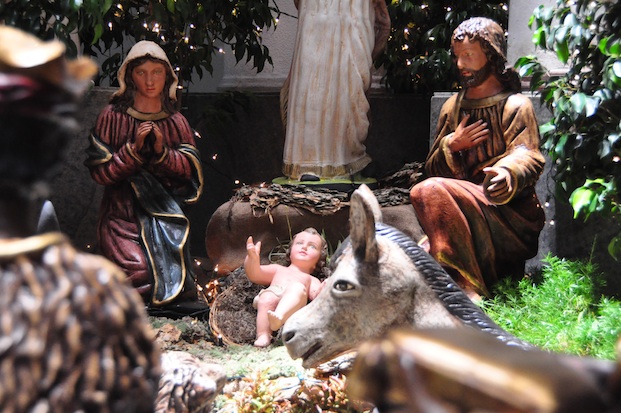I could never understand as a little girl why we sang: ‘Away in a manger, no crib for a bed.’ I knew what a manger was, and I knew that people set up cribs at home and in churches with the Child Jesus in the manger and the animals, shepherds and all the trimmings.
It turns out that I was right to be puzzled, for crib has the primary meaning of ‘a manger’, not ‘a baby’s cradle’. It’s a good old English word. Richard Rolle wrote in the 14th century of Jesus ‘born and laid in a crib between an ox and an ass’. The ox and the ass do not come from the Gospels, but from the prophetic words of Isaiah (1:3): ‘The ox knoweth his owner, and the ass his master’s crib,’ as it’s translated in the Authorised Version.
So the carol would be better as: ‘Away in a manger, a crib for a bed.’ Who was to blame for the silly version is hard to tell. The carol in its earliest known published form, in the magazine The Myrtle for May 1884, came with the quite false assurance that Martin Luther ‘composed the following hymn for his children; and it is still sung by many German mothers to their little ones’.
It’s funny that the various other meanings of crib all derive from the word meaning ‘a manger’. It can be a hovel, ‘a smoky crib’ in Henry IV Part 2. In thieves’ slang it was a place to crack or burgle. In American slang it was a saloon or low dive, even a brothel. In Cornwall and Australia it was a packed lunch. From early times it meant a basket, and thus an apparatus for draining salt in salt-making, or for catching salmon. It could be a lining for a mine or an underwater framework acting as a dam. Crib means the discarded cards that give the game of cribbage its name. It is, or was, the illicit translation allowing schoolchildren to understand their given classical text. Since we have a great capacity for ignoring unintended meanings of words, none of these senses nudges the semantic elbow-room of the crib in the carol.
A firmer grasp of cattle-shed terminology was shown by Fanny Alexander in ‘Once in Royal David’s City’. It appeared in 1848 in her Hymns for Little Children, along with ‘All Things Bright and Beautiful’ and ‘There is a Green Hill Far Away’. (That Easter hymn made children wonder why a green hill ought to have a city wall in the first place to justify the remark that it was ‘without a city wall’.)
Mrs Alexander expected Little Children to have a better knowledge of obsolete vocabulary. Without first meant ‘outside’, and was used in that sense by good King Alfred in his translation of Orosius, a historian born in the rainier part of Iberia who became a student of St Augustine of Hippo. The meaning with absence of did not develop until about 1200, when it was used by the spelling reformer Orrm, who mentioned bread withth utenn berrme — without yeast. (Double letters were important to Orrm.)
When writing her book of hymns, the author was still Miss Humphreys, for she married William Alexander only later in 1848. The Oxford Dictionary of National Biography rather oddly refers to her as ‘Cecil’, as though she were a family friend. But I think those who knew her well called her Fanny.
Mrs Alexander rightly says in her hymn or carol that Jesus had a ‘manger for his bed’ and ‘his cradle was a stall’. You might think that strictly a stall is where cattle stand, but the word has for centuries also meant ‘a manger’. The mid-15th-century Promptorium parvulorum, written for children, like Mrs Alexander’s Hymns, gives the Latin for ‘stall’ as presepe.
Mrs Alexander indulged in archaism when it suited her metre. ‘And He feeleth for our sadness, / And He shareth in our gladness,’ is not an ineffectual couplet, but the —eth is obviously deployed to make extra syllables. Otherwise, the carol is notable for its fondness for the word lowly, using it four times, twice of the cattle shed or stable, once of the folk with whom Jesus shared his daily life and once of the Blessed Virgin Mary.
To the hard-boiled Little Children at whom the work was directed, it may have occurred, as it did to me, to wonder why in heaven Jesus’s children ‘all in white shall wait around’. What were they waiting around for? But it would be anachronistic to expect Mrs Alexander to have been aware of any ambiguity. The phrasal verb wait around, like hang about, had not yet come into use. Wait around in that sense was at first American. In 1895, for example, it was employed by Jesse Lynch Williams (who in 1918 was to win a Pulitzer Prize for drama) in a book about journalists, some of whom are waiting around in the office because it is raining. Mrs Alexander simply uses around as an adverb.
‘Around the throne of God a band / Of bright and glorious angels stand,’ a more voluminous hymnodist than Mrs Alexander wrote in his own Hymns for Children (1842). This was John Mason Neale, who in the same year was ordained, married and consigned to Madeira to recover from consumption, which did nothing to diminish an astonishing outpouring of translations and original writing for the next 20 years. His angels around God’s throne come perhaps from the book of Revelation (7:11).
Even more baffling to a child (me) was the syntax of quite a jolly carol that we sang at school. ‘The first Nowell the angels did say / Was to certain poor shepherds in fields as they lay.’ Were the angels saying that the first Nowell, whatever that was, was somehow towards certain poor shepherds. Or was it that the angels simply did say ‘Nowell’ for the first time? The latter is the case, I now know.
Nowell comes from the Latin natalis, though you’d hardly think so. By the time the French had mangled it into nouel in the 13th century, they were happily using it as an interjection, which the English picked up. Chaucer uses it thus, and the contemporary author of that really rather good Christmas tale, Sir Gawain and the Green Knight, uses it to mean Christmas itself. When Jesus was born, the angels did not literally say Nowell to anyone, but one can see what the carol intends. As a girl of seven I could not see, and was unable to formulate my ignorance in order to ask.
Got something to add? Join the discussion and comment below.
Get 10 issues for just $10
Subscribe to The Spectator Australia today for the next 10 magazine issues, plus full online access, for just $10.
You might disagree with half of it, but you’ll enjoy reading all of it. Try your first month for free, then just $2 a week for the remainder of your first year.















Comments
Don't miss out
Join the conversation with other Spectator Australia readers. Subscribe to leave a comment.
SUBSCRIBEAlready a subscriber? Log in